SAGLEV’s new electric vehicle assembly plant in Lagos marks a significant step towards revolutionizing Nigeria’s transportation landscape. With an initial capacity of 2,600 vehicles per year and a projected expansion to 10,000 units annually, the facility aims to contribute substantially to the country’s sustainable mobility goals. The plant’s strategic focus on assembling electric BRT buses and passenger cars directly addresses the growing demand for efficient and eco-friendly urban transport solutions. This venture not only promises to reduce Nigeria’s carbon footprint but also positions the nation as a key player in the burgeoning global electric vehicle market. The initiative aligns with the broader global shift towards cleaner energy and transportation, contributing to a more sustainable future for Nigeria.
The driving force behind SAGLEV’s ambitious project is its commitment to affordability and local production. Chairman and CEO Sam Faleye underscored this vision, highlighting the company’s dedication to providing electric vehicles at prices significantly lower than their petrol-powered counterparts – under 60%, to be precise. This pricing strategy, coupled with the inclusion of a charger with each vehicle, aims to democratize access to electric mobility, making it a viable option for a wider segment of the Nigerian population. Addressing potential concerns about charging infrastructure, Faleye reassured that even homes with standard 20 kVA generators possess the capacity to charge these modern electric vehicles, alleviating anxieties about accessibility and practicality. This approach directly tackles a major barrier to electric vehicle adoption – cost – making clean transportation a more realistic prospect for Nigerian consumers.
The three-year journey to establish the plant, encompassing meticulous planning, regulatory approvals, and comprehensive staff training, underscores SAGLEV’s commitment to building a robust and sustainable operation. The company’s proactive approach to workforce development reflects an understanding of the importance of skilled labor in driving innovation and ensuring the long-term success of the venture. The launch of the plant isn’t just a symbolic gesture; it’s a tangible demonstration of SAGLEV’s readiness to deliver, with their electric vehicles already making their presence felt on Nigerian roads. This highlights the company’s dedication to not just producing vehicles, but actively integrating them into the existing transportation infrastructure.
SAGLEV’s strategic partnerships further solidify its commitment to integrating electric vehicles into Nigeria’s public transport network. Their collaboration with agencies like the Lagos Metropolitan Area Transport Authority (LAMATA) highlights the potential for large-scale adoption of electric buses within urban areas, creating a ripple effect on the overall transportation ecosystem. This collaborative approach is essential for driving widespread adoption and ensuring that electric vehicles become a seamless part of the public transportation system. By working with established transport authorities, SAGLEV is paving the way for a smoother transition towards electric mobility in Nigeria’s major cities.
The launch of the SAGLEV plant has garnered strong support from key stakeholders in the automotive and financial sectors. The National Automotive Design and Development Council (NADDC), represented by Deputy Director of Press and Protocol Felicia Oyebolu, lauded the development as a testament to Nigeria’s growing capacity not just to import but also to manufacture vehicles. This shift from consumption to production marks a pivotal moment in Nigeria’s automotive industry, signaling a transition towards greater self-reliance and technological advancement. The NADDC’s endorsement emphasizes the national significance of the project, positioning it as a driver of economic growth and technological innovation.
Keystone Bank’s Head of Business Sustainability, Akinwunmi Olukeye, echoed this sentiment, highlighting the environmental and economic benefits of electric vehicles. His endorsement underscores the growing recognition within the financial sector of the viability and importance of sustainable investments. Keystone Bank’s support reinforces the message that electric vehicles are not just an environmentally sound choice but also a smart business decision, aligned with Nigeria’s broader sustainability goals. This convergence of government and private sector support creates a fertile ground for the growth of the electric vehicle industry in Nigeria. The plant’s opening marks not just the beginning of a new chapter for SAGLEV but also a significant milestone in Nigeria’s journey towards a cleaner, more sustainable future.














